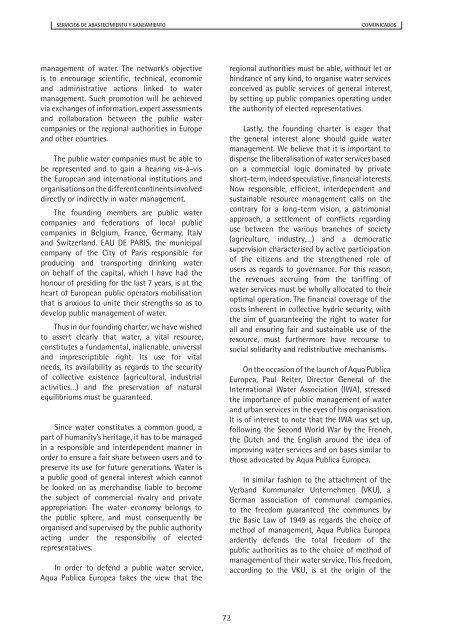Servicios de Abastecimiento y Saneamiento - La Tribuna del Agua
Servicios de Abastecimiento y Saneamiento - La Tribuna del Agua
Servicios de Abastecimiento y Saneamiento - La Tribuna del Agua
You also want an ePaper? Increase the reach of your titles
YUMPU automatically turns print PDFs into web optimized ePapers that Google loves.
SERVICIOS DE ABASTECIMIENTO Y SANEAMIENTO<br />
management of water. The network’s objective<br />
is to encourage scientific, technical, economic<br />
and administrative actions linked to water<br />
management. Such promotion will be achieved<br />
via exchanges of information, expert assessments<br />
and collaboration between the public water<br />
companies or the regional authorities in Europe<br />
and other countries.<br />
The public water companies must be able to<br />
be represented and to gain a hearing vis-à-vis<br />
the European and international institutions and<br />
organisations on the different continents involved<br />
directly or indirectly in water management.<br />
The founding members are public water<br />
companies and fe<strong>de</strong>rations of local public<br />
companies in Belgium, France, Germany, Italy<br />
and Switzerland. EAU DE PARIS, the municipal<br />
company of the City of Paris responsible for<br />
producing and transporting drinking water<br />
on behalf of the capital, which I have had the<br />
honour of presiding for the last 7 years, is at the<br />
heart of European public operators mobilisation<br />
that is anxious to unite their strengths so as to<br />
<strong>de</strong>velop public management of water.<br />
Thus in our founding charter, we have wished<br />
to assert clearly that water, a vital resource,<br />
constitutes a fundamental, inalienable, universal<br />
and imprescriptible right. Its use for vital<br />
needs, its availability as regards to the security<br />
of collective existence (agricultural, industrial<br />
activities…) and the preservation of natural<br />
equilibriums must be guaranteed.<br />
Since water constitutes a common good, a<br />
part of humanity’s heritage, it has to be managed<br />
in a responsible and inter<strong>de</strong>pen<strong>de</strong>nt manner in<br />
or<strong>de</strong>r to ensure a fair share between users and to<br />
preserve its use for future generations. Water is<br />
a public good of general interest which cannot<br />
be looked on as merchandise liable to become<br />
the subject of commercial rivalry and private<br />
appropriation. The water economy belongs to<br />
the public sphere, and must consequently be<br />
organised and supervised by the public authority<br />
acting un<strong>de</strong>r the responsibiliy of elected<br />
representatives.<br />
In or<strong>de</strong>r to <strong>de</strong>fend a public water service,<br />
Aqua Publica Europea takes the view that the<br />
72<br />
COMUNICADOS<br />
regional authorities must be able, without let or<br />
hindrance of any kind, to organise water services<br />
conceived as public services of general interest,<br />
by setting up public companies operating un<strong>de</strong>r<br />
the authority of elected representatives.<br />
<strong>La</strong>stly, the founding charter is eager that<br />
the general interest alone should gui<strong>de</strong> water<br />
management. We believe that it is important to<br />
dispense the liberalisation of water services based<br />
on a commercial logic dominated by private<br />
short-term, in<strong>de</strong>ed speculative, financial interests.<br />
Now responsible, efficient, inter<strong>de</strong>pen<strong>de</strong>nt and<br />
sustainable resource management calls on the<br />
contrary for a long-term vision, a patrimonial<br />
approach, a settlement of conflicts regarding<br />
use between the various branches of society<br />
(agriculture, industry,…) and a <strong>de</strong>mocratic<br />
supervision characterised by active participation<br />
of the citizens and the strengthened role of<br />
users as regards to governance. For this reason,<br />
the revenues accruing from the tariffing of<br />
water services must be wholly allocated to their<br />
optimal operation. The financial coverage of the<br />
costs inherent in collective hydric security, with<br />
the aim of guaranteeing the right to water for<br />
all and ensuring fair and sustainable use of the<br />
resource, must furthermore have recourse to<br />
social solidarity and redistributive mechanisms.<br />
On the occasion of the launch of Aqua Publica<br />
Europea, Paul Reiter, Director General of the<br />
International Water Association (IWA), stressed<br />
the importance of public management of water<br />
and urban services in the eyes of his organisation.<br />
It is of interest to note that the IWA was set up,<br />
following the Second World War by the French,<br />
the Dutch and the English around the i<strong>de</strong>a of<br />
improving water services and on bases similar to<br />
those advocated by Aqua Publica Europea.<br />
In similar fashion to the attachment of the<br />
Verband Kommunaler Unternehmen (VKU), a<br />
German association of communal companies,<br />
to the freedom guaranteed the communes by<br />
the Basic <strong>La</strong>w of 1949 as regards the choice of<br />
method of management, Aqua Publica Europea<br />
ar<strong>de</strong>ntly <strong>de</strong>fends the total freedom of the<br />
public authorities as to the choice of method of<br />
management of their water service. This freedom,<br />
according to the VKU, is at the origin of the


